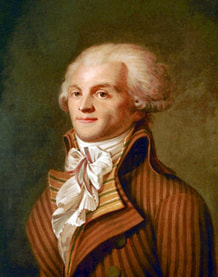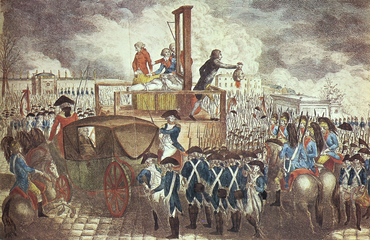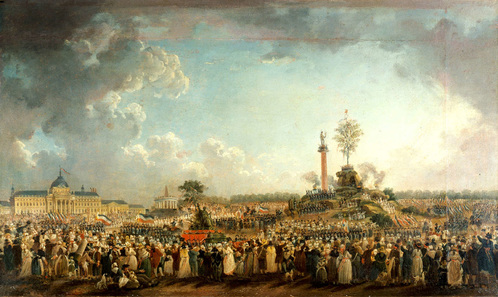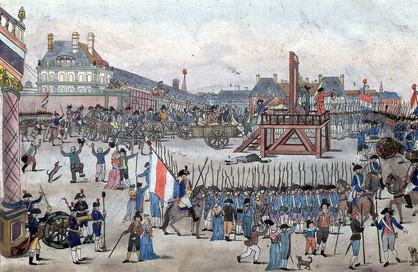MAXIMILIEN ROBESPIERRE
|
Maximilien Robespierre was born on May 6th, 1758 in Arras, Artois, France. Robespierre was the oldest of four children. His mother died in July of 1764 due to complications related to childbirth and his father, François de Robespierre, left the children to travel Europe. Maximilien and his siblings were raised by their paternal aunts.
Showing promise from an early age, Robespierre trained to be a lawyer, just as his father had been. While in school, he was exposed to the new ideas of the Age of Enlightenment and read the works of several Enlightenment thinkers. In particular, Robespierre read the works of Jean-Jacques Rousseau and adopted many of his views as his own. For example, Robespierre believed that the people of France were more well-equipped to handle the issues facing the country than the absolute monarchy. |
A key attribute of Robespierre throughout his life was his conviction to his principles. This characteristic would gain him the nickname of the “Incorruptible” as he was viewed as unwavering in his ideals. Eventually, he would play a pivotal role in the events of the French Revolution.
The first major event of the revolution was when Louis XVI called the Estates-General in May of 1789. Robespierre was elected a representative of the third estate and helped establish the National Assembly and would often speak of his ideals of liberty to the members of the assembly. His speeches would go on to have an impact on the principles of the Declaration of the Rights of Man and of the Citizen.
Following the end of the National Assembly, Robespierre joined the famous Jacobin Club, which was an anti-royalist organization during the French Revolution. As well, he began working as a public prosecutor in Paris. Throughout 1792, he fought against the principles of the newly created Legislative Assembly, including a proposed war against Austria. He argued that the revolution must focus on fighting internal strife rather than wars against neighboring countries.
|
After the Legislative Assembly dissolved and made way for the more radical National Convention, Robespierre left his position as public prosecutor and was elected first deputy for Paris to the National Convention. The convention moved quickly to put Louis XVI on trial. Louis XVI was charged with treason due to his attempt to flee the country and was convicted. Robespierre commented that “Louis must die so the nation may live.” Louis XVI’s punishment was death and on, January 21st, 1793, he was executed by guillotine.
|
Soon Robespierre began his own rise to power within the revolution. He was the head of the Committee of Public Safety, which was the executive committee of the National Convention, and would become well known for its role in carrying out the Reign of Terror. For many months throughout 1794, Robespierre battled against other revolutionaries in the National Convention by questioning each of their loyalties towards the revolution. For example, he accused many people of being domestic threats to the continuation of the revolution. It is during this time that many prominent revolutionaries within the National Convention were guillotined for their perceived betrayal to the revolution and Robespierre maneuvered his way to the head of the convention. For example, when Georges Danton, a leading revolutionary, called for an end to the Reign of Terror he was the next to face the guillotine. Finally, on June 4th, 1794, Robespierre was elected the president of the National Convention.
Robespierre then declared a new religion called the Supreme Being and carried out a series of celebrations based around the new faith. On June 8th, 1794, Robespierre oversaw the Supreme Being Festival in Paris that would be celebrated based on a new calendar. Some members of the National Convention and Committee of Public Safety were visibly upset with the celebration and the actions of Robespierre. In fact, Robespierre had begun to make many enemies within the revolution after he claimed to have a list of people that were enemies of the state. By threatening to release the names, he angered others who began to work against him and accuse him of acting like a dictator.
Based on his actions and threats the National Convention voted to arrest Robespierre. On July 28th, 1794, soldiers stormed into where he was staying. As the soldiers arrived, he attempted to commit suicide by gunshot to the head, but was instead only injured in the jaw, shattering it. For the rest of the day, Robespierre was held captive until he was guillotined without a trial that same afternoon. With his death, the fear and paranoia of the revolutionaries ended and the Reign of Terror was over. After the execution of Robespierre and the excess of the Reign of Terror, the National Convention was replaced by the Directory in 1795.
CITE THIS ARTICLEAUTHOR
|
|




